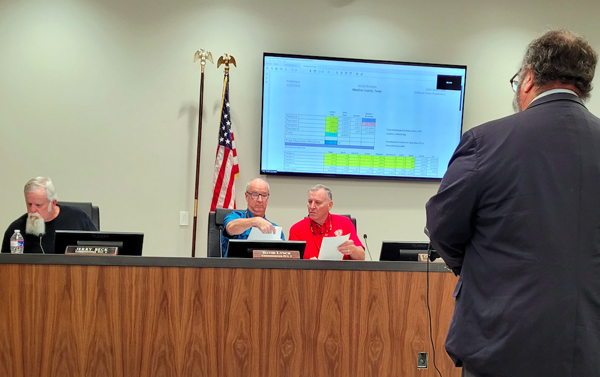The Commissioners Court of Medina County held a special meeting on October 28th, 2021 at 9:30a.m. to discuss opportunities to spend the American Rescue Plan Act Funds (ARPA) on projects available and discussed redistricting. Commissioners Jerry Beck, David Lynch, County Judge Chris Schuchart, and Commissioners Larry Sittre and Tim Neuman were all present for this meeting.
With only two items on the agenda, County Judge Chris Schuchart explained to the court that this meeting would operate more as a workshop, as nothing would be set in stone during these discussions but would instead act as potential plans for the future. The court then began their discussions with ideas on how to spend ARPA Funds.
Work-shopping Potential Allocations Of ARPA Funds
With already 5 million dollars in their possession, Medina County is expecting to receive another 5 million dollars in March, for a total of 10 million dollars in ARPA Funds overall. Noting that other counties have focused their funds on employees, Judge Schuchart began the conversation with possible plans to spend Medina County funds on broadband.
The court received bids from several broadband providers. $410,000 from Sago located near Lacoste, $110,000 from CASCOM, a bid from RockSolid and AT&T for no current dollar amount, Rise Broadband, a large broadband that currently represents 17 states and rNetworks which is offering to build 13 sites for 1.2 million that will cover 50,415 people.
When discussing on how to narrow their choices concerning broadband,Commissioner Larry Sittre explained to the court in what direction he’d like the money to go.
“Every commissioner’s court for years and years every time we get bids off of people, you hear it from the commissioner’s court ‘use local,’” Sittre said.“I am 100% on this thing to use local. That would cut out AT&T, RockSolid, even though they were a local company they got bought out by a group somewhere out in the valley. But I would like to give this money directly to the companies in Medina.”
Commissioner Jerry Beck echoed this idea; following up his comment with a question about whether or not Texas law would limit their choices.
“I would like to see local tax dollars spent local too…,” Commissioner Beck said. “But aren’t we bound to the lowest bidder?”
Explaining that they still needed to look into whether that requirement would limit the County or not on which bid they could take, Commissioner Larry Sittre continued the discussion by suggesting they also allocate some of their funds to sewer.
“If we’re going to get 5 million now and 5 million sometime later …I would like to ear mark some of that for sewer,” Sittre said.“Some of these people have sewer issue already in some of these developments. It looks like Castroville is kind of blocked out, if we can get some of the money to help them rebuild something they got or private individuals, help them build something else. We need to focus this thing; to make sure people are being taken care of. I think we really need to do something on sewer…”
Scott Dixon, City Administrator of Castroville, stood from the benches to add his suggestion into the discussion, recommending Medina County instead put their funding into emergency management.
“In my mind, the use of those funds should be for something that would not get funding but for the fact that this money happens to be available,” Dixon said. “So my recommendation is to not spend it on water or sewer because we have utilities that have comprehensive capital improvement plans. We have plenty of mechanisms to make those types of improvements. But things like drainage or emergency management or flooding, those types of issues I think, are very important and urgent when they arise but they don’t necessarily have some funding mechanism tied to them.”
Judge Schuchart then added how he’d like to approach negotiating with water, broadband or whomever they decided in the end to allocate the funds to.
“We’re going to write up a contract so I can go up to each person,” Judge Schuchart said. “…if ya’ll tell me we’re going to give East Medina half a million dollars then East Medina is going to come in and give me hard information on what they’re going to buy with it, and we’ll fund it to them, and they’ll have an agreement with us. I’m going to give everyone a mic check. That’s kind of the way I see this.”
Judge Schuchart said that they plan to give the money to whomever they choose through an upfront payment rather than a reimbursable payment to make sure that they can pay for what they need to do. When finished with their task, the provider will then come back and prove to Medina County that they did what they were asked to do.
“The auditor’s office will make sure that as we distribute money out, it’s being spent on what we say it needs to be spent on,” Judge Schuchart said.“And that’ll be an agreement we make with the providers, so for money…we’re not going to give it to them all at once. We’ll give it to them as they approve and as they put together their proposals.”
The court then came to unanimous decision on how they potentially plan to allocate their funding.
“…we’re not going to take any action, but I think you’re giving me direction,” Judge Schuchart said. “We go local with the broadband providers, we keep a million back, we spend four, and we keep it in Medina County.”

Unfinished Discussions On Redistricting
Ending the discussion on the ARPA Funds, the court moved onto discussion about redistricting. Frank Friday represented Alison & Bass, the Austin-based law firm Medina County hired to help with their redistricting process. Presenting the court with the current census results for Medina County, Friday explained the reasoning behind Medina County’s need for redistricting.
“Every ten years the census comes in and the requirement of the ruling….gives counties the opportunity to redistrict,” Friday said. “If the maximum deviation between the counties largest precinct from the ideal population to the smallest precinct from the ideal population, if that exceeds 10% then you’re required to redistrict. And looking at the figures you are now above the deviation maximum with 31.38%. The difference is primarily between Precincts 2 and 3, with it being over for 2 and under for 3.”
According to Friday, Precinct 2 was overloaded by about 2,400 votes, while precinct 3 was under about 12,434 votes. Starting the discussion, Sittre stepped up to the map and proposed his idea for the potential redistricting.
In charge of Precinct 2, Sittre presented his potential solution to the court with the goal of lowering the population count within his district.
“My original thoughts when we were going to do redistricting years ago was to cut off at Pearson road here, then it goes from 2790 all the way to 471 is a perfect cut off point,” Commissioner Sittre said.
Finishing his proposal, Sittre promised that whichever commissioner ended up with the portion he had dropped, that all roads would already be paved before passed onto them. However, David Lynch did not agree with this proposal, explaining that Sittre’s proposal would end up giving him more roads to maintain in the future when his district already struggles to fund his current number of roads. Precinct 1 has the most miles of road of all the precincts, followed by precinct 3, with precincts 4 and 2 having the least miles of road.
“I become quite the whiner during budget time, because I’ve got the second most miles of road in a precinct and the least appraised value,” Commissioner Lynch said. “Your tax money is divided based on the appraised value of the precinct that you live in, and that’s divided accordingly or proportionally to all the commissioners. So if your appraised value in your precinct is low, then the tax revenue you receive to maintain the roads is low regardless of how many miles of road you have. So having the second most miles of road and the lowest income of your tax money makes it very difficult to maintain and actually give people the service that they need. Doesn’t matter who the commissioner is, doesn’t matter what ethnicity they are, they don’t have the tools that they need to work with.”
Redrawing over what Sittre had proposed, Commissioner Lynch then proposed his potential solution to the current redistricting problem to the court.
“I would propose making Hondo one block of population, moving precinct 3 back a little bit from the east, adding some to the west as we need to, so Tim’s not going all the way over to the county line on this side…That’s my proposal.”
Commissioner Lynch claimed that the current lines drawn make it difficult for him to reasonably reach the parts of the county he represents.
“Part of the problem is, if you notice every municipality in the county including the unincorporated areas: Devine, Castroville and Natalia, all of them are undivided except for Hondo,” Commissioner Lynch said. “Hondo was divided right in half, for political reasons. I would propose, if I had my way to fix precinct 3, I would make Hondo a unified city like every other city within the county and that additional population that precinct 3 would gain, because I would take that section, would allow that eastern side to come back over where it needs to be…My whole issue is trying to service the people I represent, and it’s very difficult when you’re based over here and trying to do things way over there any time there’s bad weather, or flooding…”
Continuing their attempts to redraw their districts to follow requirements, Commissioner Jerry Beck explained to the court the obstacles the court faced in their redistricting process alongside ensuring other officials weren’t accidentally drawn out of their districts.
“And we’re in this predicament today, as you well know, as a result of a lawsuit filed and it was that kind of deal where we were force-fed the results,” Commissioner Beck said. “And if we lose what the lawsuit acquired, which is another minority-majority precinct, we’re probably going to have another lawsuit.”
Commissioner Beck is referring to a since resolved lawsuit filed against the county on November, 10th, 2011 where the plaintiffs claimed that the new redistricting plan at the time reduced the concentration of minorities in Precinct 3. After the lawsuit, the commissioners revised the map, leaving Precinct 3 with a larger portion of South Hondo and Precinct 4 with all of Natalia.
The court then opened up to public insight on what they had proposed so far concerning redistricting and Lloyd Richardson from Devine spoke up to share his concerns about what he’d seen drawn so far, specifically a long portion of empty land included in Precinct 4.
“I disagree with Jerry on that entire green gerrymandered thing between precinct 2 and precinct 4. At some point you need to look at this thing from a logistics point of view, from the people doing the maintenance. But you’re not addressing the problem. If you look where the yard is in Devine and where the yard is in D’Hanis: Why in God’s green apples would you not include that zone between 2 and 4 in 2?”
The court countered Richardson,defending their decision, but agreed to take Richardson’s words into consideration.
“Everyone agrees with you, but we have to go by what the federal judge says as a result of the lawsuit,” Commissioner Beck said. “I think it ought to be incorporated in the other precincts but we couldn’t do it, because it would result in a lawsuit.”
If the redistricting is not finalized by November 13th the March primary elections will be postponed until May. Judge Schuchart announced to the court that redistricting would be continued and hopefully finalized Wednesday, November 3rd at 9 a.m.
By Christian Toler
News Correspondent
